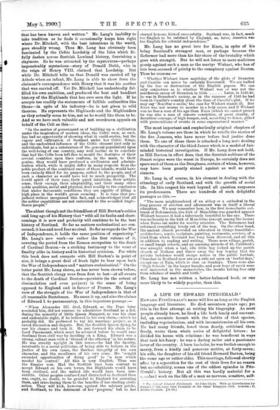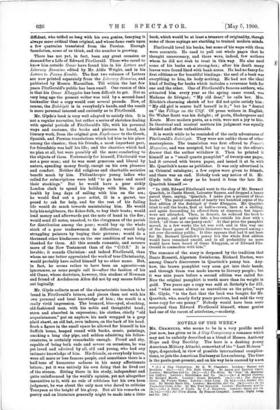A LIFE OF EDWARD FITZGERA.LD.*
EDWARD FITZGERALD'S name will live as long as the English language and literature. He died seventeen years ago; yet this is the first attempt at writing his biography. As most people already know, he lived a, life both lonely and unevent- ful, an eccentric hermit with the habits of that species, including vegetarianism, and with inconsistencies all his own. He had many friends, loved them dearly, criticised them freely, wrote them whole series of delightful letters : he divided his house with relations : he was beneficent in ways that took his fancy : he was a daring sailor and a passionate lover of the country. A born bachelor, he was foolish enough to marry, from a kindly and generous motive, at forty-seven ; his wife, the daughter of his old friend Bernard Barton, being the same age or rather older. This marriage, followed shortly after by a separation for the rest of their lives for no reason but unsuitability, seems one of the oddest episodes in Fitz- Gerald's history. But all this was hardly material for a s...ndard work on the life of a man so nervous, sensitive, self- • The Life of Edward FitzGerald. ByJohn Glyde. With an Introduction by Edward Ciodd, some time President of the Omar Khayyam Club. London : O. Arthur PeArson. Us. 6d.]
diffident, who trifled so long with his own genius, fancying it always more critical than original, and whose fame rests upon a few quatrains translated from the Persian. Enough foundation, some of us think, and the number is growing.
There has not yet, in fact, been any great occasion or demand for a Life of Edward FitzGerald. Those who cared to know him outside Omar have found him in his Letters and Literary Remains, edited by Mr. Aldis Wright, and in his Letters to Fanny Kemble. The first two volumes of Letters are now printed separately from the Literary Remains, and published by Messrs. Macmillan. Till within the last few years FitzGerald's public has been small. One reason of this is that his Omar Khayycim has been difficult to get. Not so very long ago the present writer was told by a second-hand bookseller that a copy would cost several pounds. Now, of course, the RubciiyOt is in everybody's hands, and the result is more personal interest and curiosity as to FitzGerald.
Mr. Glyde's book is very well adapted to satisfy this. It is not a regular narrative, but rather a series of sketches dealing with special periods of FitzGerald's life, with his personal ways and customs, the books and pictures he loved, his literary work, from the original gem Euphranor to the Greek, Spanish, and Persian translations which led him to his place among the classics; then his friends, a most important part, for friendship was half his life; and the charities which had no plan at all, but were possibly all the more comforting to the objects of them. Fortunately for himself, FitzGerald was not a poor man ; and he was most generous and liberal by nature, spending money freely, except on his own pleasure and comfort. Neither did religious and charitable societies benefit much by him. Philanthropic young ladies who called for subscriptions were told "to go home and mend their stockings." But he would have a poor sickly London clerk to spend his holidays with him, to gain health by long days of sailing with him on the sea; he would find out a poor artist, ill in a garret, too proud to ask for help, and for the rest of his failing life would do much towards maintaining him. He would help his neighbours, the fisher-folk, to buy their boats ; would lend money and afterwards put the note of hand in the fire ; would send £5 notes, unasked, to the clergyman of the parish for distribution among the poor ; would buy up the whole stock of a poor tradeswoman in difficulties; would help struggling painters by buying their pictures; would do a thousand other kindnesses on the one condition of not being thanked for them. All this sounds romantic, and savours more of the New Testament than of the " C.O.S." It is lovable; it sounds Christian : and indeed FitzGerald, than whom no one better appreciated the work of true Christianity, would probably have called himself by no other name. But, in fact, he seems rather to have been an agnostic—an ignoramus, as some people call it—after the fashion of his old Omar, whose doctrines, however, this student of Newman and friend of Archdeacon Allen did not by any means follow out logically.
Mr. Glyde collects most of the characteristic touches to be found in FitzGerald's letters, and pieces them out with his 3wn personal and local knowledge of him ; the result is a really vivid impression. The bronzed, blue-eyed, slouching, old-fashioned man, with his noble and thoughtful head; stern and absorbed in expression; his clothes, chiefly "old acquaintances," put on anyhow, his neck wrapped in a grey plaid shawl, an old hat, even indoors, on the back of his head. Such a figure in the small space he allowed for himself in his Suffolk home, heaped round with books, music, paintings, smoking a long clay pipe, and seldom admitting his fellow- creatures, is certainly remarkable enough. Proud and shy, capable of being both rude and severe on occasions, he was yet loved and admired by all, old and young, who had any intimate knowledge of him. His friends, as everybody knows, were all more or less famous people, and sometimes there is a half-tone of humorous sadness in his many affectionate letters; yet it was entirely his own doing that he lived out of the stream. Sitting there in his study, independent and quite uninfluenced by the world's opinion, yet not altogether insensitive to it, with no rule of criticism but his own keen judgment, he was about the only man who dared to criticise Tennyson at the height of his glory. But all his remarks on poetry and on literature generally might be made into a little
book, which would be at least a treasure of originality, though some of these sayings are startling to trained modern minds.
FitzGerald loved his books, but some of his ways with them were eccentric. He used to pull out whole pages that he thought unnecessary, and there were, indeed, few authors whom he did not wish to treat in this way. He also used some of his books as a strong-box ; after his death many leaves were found lined with bank-notes. He had no fancy for first editions or for beautiful bindings : the soul of a book was everything to him, its body nothing. He had not the ideal kind of feeling for books which includes a reverence both for one and the other. One of FitzGerald's famous authors, who attracted him every year as the spring came round, was Madame de Sevigne; "My old dear," he calls her. Mrs. Ritchie's charming sketch of her did not quite satisfy him : "My old girl is scarce half herself in it ; " but he " doated on" the Village on the Cliff. Of prose writers in English, Sir Walter Scott was his delight ; of poets, Shakespeare and Keats. More modern poets, as a rule, were not a joy to him.
In theatrical and musical matters his judgment was equally decided and often unfashionable.
It is worth while to be reminded of the early adventures of FitzGerald's Rubalycit. They were not unlike those of other masterpieces. The translation was first offered to Fraser'.
Magazine, and was accepted, but lay so long in the editor's drawer that the author withdrew it. Then be printed it himself as a "small quarto pamphlet" of twenty-one pages,
had it covered with brown paper, and issued it at 5s. with Mr. Quaritch's name as publisher. It was only advertised in an Oriental catalogue; a few copies were given to friends, and there was an end. Nobody took any notice of it. Mr. Glyde tells the story as he heard it from the late Mr. Quaritch himself :— "In 1859, Edward FitzGerald went to the shop of Mr. Bernard Quaritch, in Castle Street, Leicester Square, and dropped a heavy parcel there, saying, Quaritch, I make you a present of these books.' The parcel consisted of nearly two hundred copies of the first edition of the Rubdiy al of Omar Khayycim. Mr. Quaritch tried to sell the books, first at half-a-crown, then at a shilling. and again descending he offered them at sixpence, but buyers were not attracted. Then, in despair, he reduced the book to one penny, and put copies into a box outside his door with a ticket, 'all these at one penny each.' At that price the pamphlet moved, in a few weeks the lot was sold, and in this way one of the finest gems of English literature was dispersed among a not over discerning public. It thus appears that had it not been for Mr. Bernard Quaritch's penny box the whole first edition would have remained unsold, and in all probability no more would have been beard of Omar Khayyam, or of Edward Fitz. Gerald in connection with him."
The romance of the story is deepened by the tradition that Dante Rossetti, Algernon Swinburne, Richard Burton, were among Omar's discoverers in Quaritch's penny box. Any- how, the brown pamphlet very soon got into their hands, and through them was made known to literary people ; but it was nine years before a second edition was called for. Now the original pamphlet is worth more than its weight in gold. Two years ago a copy was sold at Sotheby's for £21, and "what seems almost as marvellous as the price," says Mr. Glyde, "is the fact that the book was bought for Mr.
Quaritch, who, nearly forty years previous, had sold the very same copy for one penny." Nobody would have been more
surprised than Edward FitzGerald himself, whose genius had one of the rareat of attributes ,—modesty.







































 Previous page
Previous page